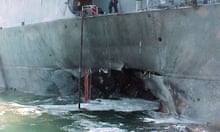British intelligence officials helped block the sale of equipment by a South African company to an Iranian firm suspected of being involved in a ballistic missile programme, according to leaked spy files.
It shows how MI6, along with the US and other allies, works to hamper what it claims is Iran’s nuclear weapons and ballistic missile programme.
The South African company has since shut down. A former employee disputed claims that it was supplying a military project, saying the Iranian company was believed to be a petrochemical firm and that the project, which was two-thirds completed when stopped, was not meant to be airborne.
“What we were building wasn’t to aerospace specifications, in our opinion, and we had been informed the company was involved in the petrochemical industry. But we were advised most strongly to stop,” the ex-employee said.
The termination of the project may have contributed to the company’s closure, he added.
According to a document marked Secret UK/SA eyes only, Britain said Electric Resistance Furnaces (ERFCO) had done a deal with Iran worth between $500,000-$1m (£324,000-£640,000), between late 2007 and early 2009.
The document is headlined: Urgent request for assistance to halt ERFCO Furnaces supplying equipment to Iran.
According to the file, ERFCO was dealing with a series of front companies, while the end user would have been the Iranian Shahid Sattari Ground Equipment Industries (SSGEI) organisation – described by the British as “responsible for the production of missile launchers and ground support equipment and … involved in the development of rocket bodies”. The end user identity was hidden from ERFCO.
The British officials did not suggest ERFCO was aware there was anything amiss with the order. But the document adds: “It is known that it will significantly enhance Iran’s ability to produce ballistic missiles, including some which would be suitable for carrying nuclear warheads.”
The former employee said the company was contacted by British and South African officials. “We were advised most strongly to stop. They said it was in our best interests to shut it down. We had no choice, so we did. We were cheesed off about it. We thought we were doing something legitimate and then suddenly we were told it wasn’t legitimate.”








